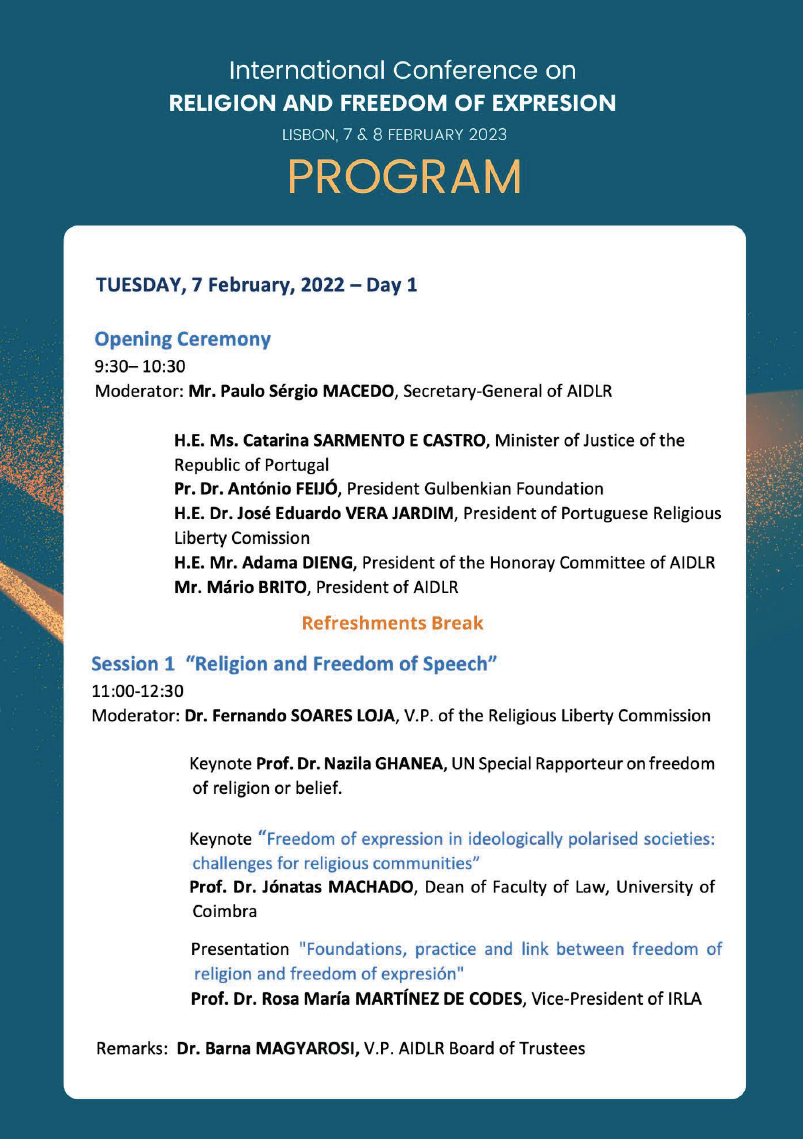Program
Press to go

Organized by

Hosted by

Calouste Gulbenkian Foundation
Av. de Berna 45 A, 1067-001 Lisboa, Portugal
Freedom of religion and freedom of expression are two fundamental freedoms, indispensable to the dignity of every person, and should therefore be considered immanent, universal and inalienable. They are protected by the Universal Declaration of Human Rights (1), the International Covenant on Civil and Political Rights (2) and the European Convention on Human Rights (3), among other sectoral and regional documents.
These two freedoms, which in turn are composed of sets of freedoms protected by specific rights, are related to each other and even merge in the exercise of these rights. Moreover, they generally coexist in regimes that respect them and both are conditioned or absent in those that limit or repress them. It is in the exercise of the rights of freedom of religion and freedom of expression that we find the concept of freedom of religious expression, both connected to the right to manifest and share religious belief present in religious freedom and to the right to externalise one's thoughts and opinions which forms part of freedom of expression. This close relationship is admitted and valued in the Declaration on the Elimination of All Forms of Intolerance and of Discrimination Based on Religion or Belief, which states, in Article 6(d): ("...the right to freedom of thought, conscience, religion or belief shall include, inter alia, the following freedoms:") "To write, issue and disseminate relevant publications in these areas". (4) Added to religious expression is the even more sensitive concept of expression about religion, which, while on the one hand, contains rights relating to freedom of expression, on the other hand, may imply that believers feel insulted and even attacked in their belief regarding deities, symbols, places and doctrines, among other elements.
Religious expression and expression about religion are thus two possible focuses of tension that affect both religious freedom and freedom of expression. To defend and promote religious freedom - objectives of the International Association for the Defence of Religious Liberty - is to defend and promote the rights to manifest the choice to have or not to have faith, to share belief with others, to debate religion in public space. These rights, however, are not respected in many places and circumstances where religious freedom and freedom of expression are limited and repressed, and they must be remembered and protected in those places and circumstances where we have become accustomed to seeing them respected and valued.
For example, the UN Interim report of the Special Rapporteur on freedom of religion or belief of October 2021, in the context of intellectual and educational freedom, draws attention to the reality of self-censorship as a way to avoid negative consequences resulting from religious expression: "Interlocutors express concern over several State practices that could pressure students and scholars, dissidents and human rights defenders, among others, to self-censor their expression to avoid sanctions such as financial hardship, violence or arrest. Such treatment might not coercively alter or sanction their thoughts, but rather limits expression of their thoughts, including through academic papers, social media posts or attending protests. This restricted flow of information could potentially affect an individual's critical development of thought." (5) Also recently, the Report of the Special Rapporteur on the promotion and protection of the right to freedom of opinion and expression, on disinformation and freedom of opinion and expression, denounces the dangers of inappropriate digital behaviour on groups of people, namely religious minorities: 'Ideological and identity-based disinformation has fostered discrimination and hatred against minorities, migrants and other marginalized communities, generating ethnic or religious tensions'.
We are facing a reality in which freedom of expression of and about religion is a fundamental value to be protected, in a particularly tense historical moment. The international documents cited refer to the strict terms in which religious freedom, only in its forum externum, and freedom of expression may be limited. The Rabat Plan of Action (7) is an effort to balance freedom of expression with the need to eradicate incitement to hatred, placing the focus of words beyond the limits more on insulting people and groups and less on ideas and beliefs. At present, new questions emerge, which add to those already mentioned, all deserving reflection and discussion: How to defend and promote freedom of religion and expression? What are the limits of religious discourse and discourse about religion? Under what circumstances can the expression of a belief be considered hate speech? Is religious expression at risk of being used as an alibi for insulting speech? Is a person or group, when not directly insulted as such, entitled to claim "not to be insulted" by the mere expression of another's faith? How is religious freedom affected by limiting freedom of expression? What influence does religious speech and about religion have on peace and understanding? Can there truly be peace and understanding if there is no freedom of religious expression? The “Religion and Freedom of Expression” Conference is a contribution of the International Association for the Defence of Religious Liberty to reflection and debate on this issue. Through this two-day meeting, this non-governmental organisation with consultative status at the United Nations and accredited in the European Union brings together, in Lisbon, a group of experts and actors, including public authorities, elected officials, clerics, academics, leaders of civil organisations and students, who will certainly contribute to bring light and richness to this reflection and debate. And, through it, to religious freedom and freedom of expression, in a free, open and plural society.